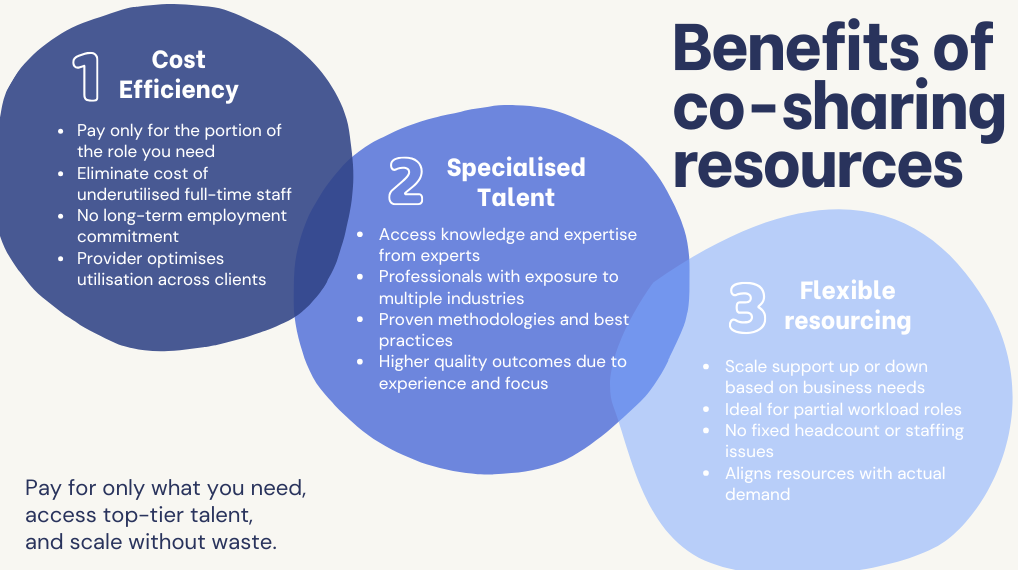
Why Trying to Do It All Could Be Holding You Back
Many businesses opt to manage their operations in-house, motivated by the belief that it offers greater control and cost transparency. However, handling everything internally can drain valuable time, energy, and resources. Retaining every function does not always lead to the best performance, especially in roles with low engagement or high staff turnover. Trying to manage everything internally can waste talent and limit your company’s ability to focus on what truly drives innovation.
At its core, outsourcing is a decision about resource allocation: whether to develop and manage a function internally or partner with an external provider who can deliver it more effectively. Though this dilemma is not new for business leaders, today’s environment marked by disruption and resource scarcity, has elevated outsourcing into a strategy for companies focused on strengthening their core competencies.
Outsourcing provides a powerful solution by delegating specialised or support functions to external service providers. This allows businesses to regain focus and dedicate more resources to innovation. However, outsourcing requires a mindset shift. It should not be about offloading work to the cheapest provider but about forming strategic partnerships to access specialised skills and resources while ensuring operational continuity. Too often, companies expect immediate cost savings and forget that outsourcing providers are businesses with their own expenses. The real value comes from leveraging their capabilities to achieve long-term efficiency and flexibility, not just short-term cost cuts.
In this article, we delve into why outsourcing is more than just a cost-saving tactic. It helps businesses enhance flexibility, sharpen their focus on key functions, and reduce hidden operational vulnerabilities. We’ll examine the strategic value of outsourcing, the necessary mindset changes, and practical advice for leveraging external capabilities.
Where Outsourcing Adds Value, Not Just Savings
Outsourcing is often seen simply as a way to cut costs, but the reality is more nuanced. While it may not always lower your expenses in absolute terms, especially when factoring in the quality, expertise, and service levels involved, it can significantly optimise your overall cost structure by enabling smarter allocation of resources.
It’s important to understand that when you outsource a function, you’re partnering with a service provider that must cover its own costs, including salaries, office space and operational logistics, all while maintaining a sustainable profit margin. This means outsourcing is rarely about paying less for the exact same work. Instead, it’s about investing in added value: access to specialised skills, operational stability, scalable resources, and continuity of service.
Rather than viewing outsourcing purely as a cost reduction strategy, business leaders should approach it as a tool that enhances flexibility and delivers consistent, high-quality outcomes. This shift in perspective helps businesses manage costs more effectively, improve business resilience and focus on core priorities.
Right-Sized Support: One Role, Many Clients

Where cost efficiency does come into play is through co-sharing resources, which addresses a common challenge for many businesses. The truth is not every role demands a full-time employee. Rather than underutilising an in-house hire, businesses can engage a service provider who distributes that same function across multiple clients. This co-sharing model is where cost savings emerge because you are only paying for the share of the role your business actually needs. It addresses a key operational gap: roles that fall between part-time needs and full-time costs. Outsourcing offers a flexible solution by allowing companies to scale resources up or down, without the long-term financial commitments and costs associated with filling these roles in-house. When a job function requires less than 100% of an individual’s capacity, outsourcing providers can efficiently allocate that same resource across multiple clients. This model ensures optimal level of utilisation, eliminating the cost inefficiencies of underused staff. This shared approach grants companies access to top-tier talent and services at a lower cost than hiring a full-time employee. This not only enhances cost-effectiveness but also allows companies to scale their support flexibly, paying only for what they actually need.
There are many companies who are trying to hire roles that don’t justify a full-time salary or they struggle to find someone affordable who meets their quality standards. The truth is: you’ll never be able to hire someone cheaper than the outsourcing provider can retain, simply because the provider optimises the employee’s time across multiple clients. This approach also addresses a key operational gap of partial workload roles. Hiring a full-time staff member when only 50% of their capacity is needed results in inefficiency, disengagement, and turnover. Co-sharing is a solution that balances cost, efficiency, and employee engagement.
Focus on What You Do Best
A company’s core competencies shape its market position and directly influence its products or services. In contrast, non-core functions such as accounting or HR maintain operational stability but do not drive market differentiation. Outsourcing enables businesses to focus on their strengths by transferring these non-core tasks to external experts. By delegating routine support functions, companies free up valuable time and resources, allowing their teams to concentrate on core activities like product development, customer engagement, and strategic growth. This focused approach boosts overall organisational efficiency by empowering internal staff to dedicate their efforts to areas that directly impact business success. As a result, businesses lighten their operational burden while enabling employees to invest energy where it truly matters, leaving routine tasks in the hands of specialists.
One of the key benefits of outsourcing is gaining access to specialised expertise that can be costly or challenging to build internally. Service providers working with diverse clients across industries develop deep knowledge, best practices, and advanced skills that deliver higher-quality results. Their broad experience enables them to anticipate challenges, implement efficient solutions, and stay current with evolving regulations and technologies. By entrusting these functions to experts, businesses improve accuracy, compliance, and innovation without the ongoing demands of training and recruitment. This strategic use of external expertise empowers organisations to elevate performance while focusing internal resources on their core business priorities.
Minimise Productivity Losses from High Staff Turnover
Many businesses face challenges in retaining talent for routine yet essential functions such as accounting. The repetitive nature of these functions can impact employee satisfaction and motivation, leading to higher attrition rates over a relatively brief period. These are the type of roles where companies often face high turnover, because the work can become monotonous and growth paths are limited. This creates a disruption cycle: new hires, training periods, mistakes during handovers, and loss of institutional knowledge. These frequent staff changes disrupt daily operations and generate significant costs related to recruiting and training replacements. Recognising the full impact of disruption is the first step toward building a more resilient support structure. Outsourcing helps mitigate this risk by transferring responsibility to specialised providers equipped to ensure workforce continuity and operational stability. These companies can actively rotate employees across various roles and clients, maintaining staff engagement and minimising burnout. This flexible approach enables seamless transitions and consistent service delivery, helping your business avoid operational disruptions commonly caused by high turnover.
Furthermore, service providers are equipped to manage workforce variability seamlessly. They are designed to retain and rotate talent within a structured environment. Staff who handle routine tasks are part of a broader system that gives them variety, peer learning, and career growth within the firm. This internal flexibility allows service providers to deliver continuity to clients, even if the specific individual changes. That means fewer disruptions and smoother transitions for your business. When an internal employee takes extended leave, the business often faces disruptions or costly temporary hires. In contrast, co-shared resources and larger service teams provide backup and rotation, ensuring continuity without the overhead of constant recruitment or training.
Financial Functions: A Reliable Starting Point for Outsourcing
When it comes to managing business functions, companies often face a critical decision. Which activities should be retained internally and which could be delegated externally? Retaining core competencies in-house ensures direct control over the most strategic and value-generating aspects of the business, safeguarding proprietary knowledge and maintaining alignment with long-term goals. At the same time, forming strategic partnerships with trusted companies offer a collaborative approach to accessing complementary skills and resources. By carefully balancing internal expertise with external partnerships, organisations can optimise resource use and position themselves for sustained growth.
For businesses exploring outsourcing for the first time, finance and accounting functions are often an ideal starting point. Accounting is often regarded as a safe and logical area to outsource because it involves standardised processes, clear regulatory frameworks, and well-defined deliverables. As such, it carries minimal risk to customer experience or core internal processes. This uniformity makes it easier to transfer responsibilities without disrupting core business activities. By starting with financial functions, companies can experience the benefits of outsourcing, such as improved accuracy, compliance, and cost management. At the same time, it minimises exposure to reputational risks, making it an ideal initial step in a broader strategic partnership.
Outsourcing for Every Business Size
Outsourcing is not limited to large corporations and it can offer significant advantages for businesses of all sizes. SMEs can access high-quality knowledge and scalable resources that would otherwise be beyond their reach. Co-sharing resources enables these smaller companies to access specialised capabilities without overextending their budgets or teams. This allows them to improve operational flexibility and respond swiftly to market changes without the burden of hiring and retaining full-time staff for a particular function. For larger organisations, outsourcing provides the agility to focus on core competencies while streamlining support activities. Regardless of size or industry, outsourcing enables businesses to optimise resource allocation and enhance efficiency.
Conclusion: The Untapped Advantage for Your Business
Outsourcing is far more than a cost-cutting measure. By partnering with external service providers, companies can focus their internal resources on core competencies while benefiting from flexible solutions tailored to their needs. By adopting a co-sharing model, businesses can pool specialised expertise with others, ensuring optimal productivity without lowering quality. Embracing outsourcing with this mindset shift empowers businesses to mitigate risks and navigate an increasingly complex environment with greater confidence. It isn’t about offloading tasks, it’s about smarter resource allocation, accessing skilled expertise, and ensuring continuity in critical business functions. By rethinking how and why we outsource, leaders can build more agile and responsive organisations.
Stay ahead with exclusive insights! Sign up for our mailing list and never miss an article. Be the first to discover inspiring stories, valuable insights and expert tips – straight to your inbox!




